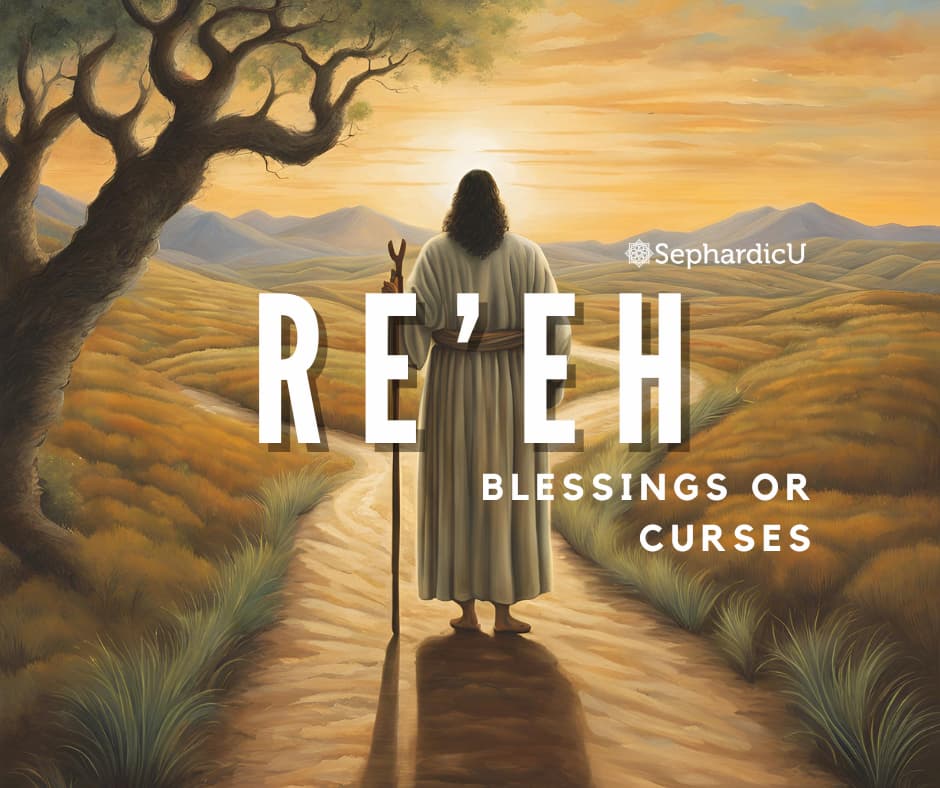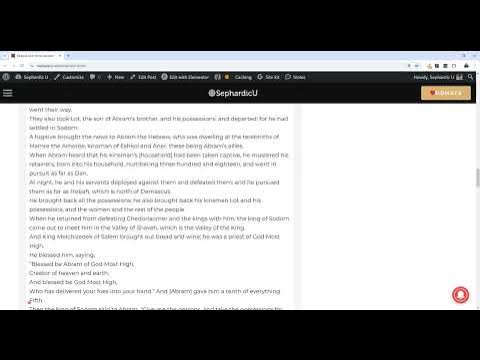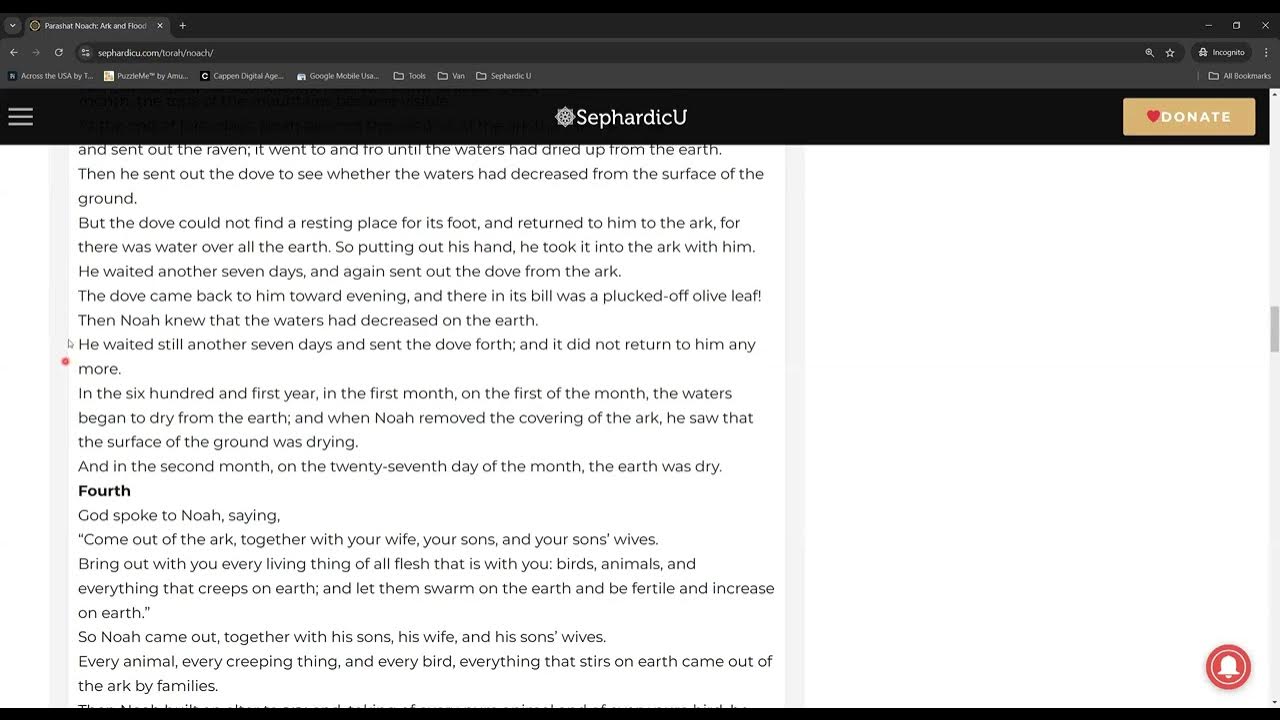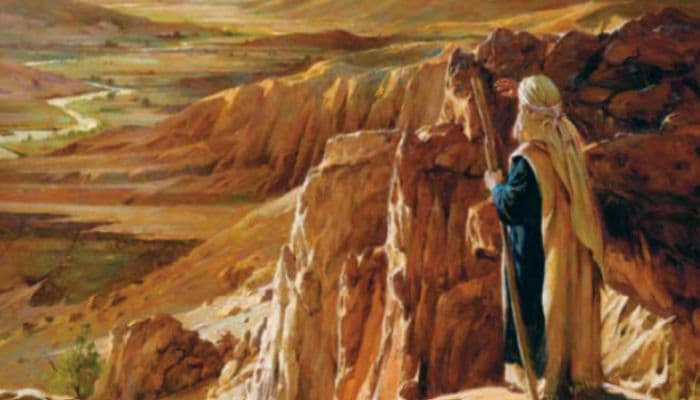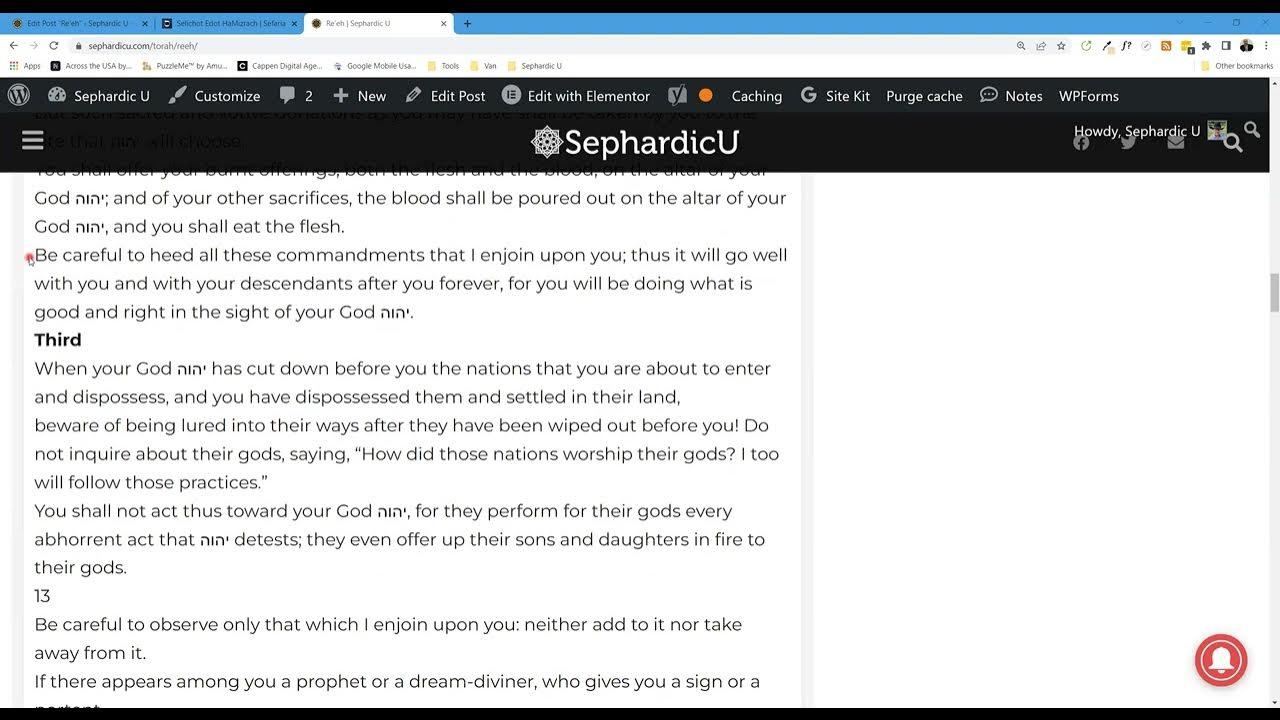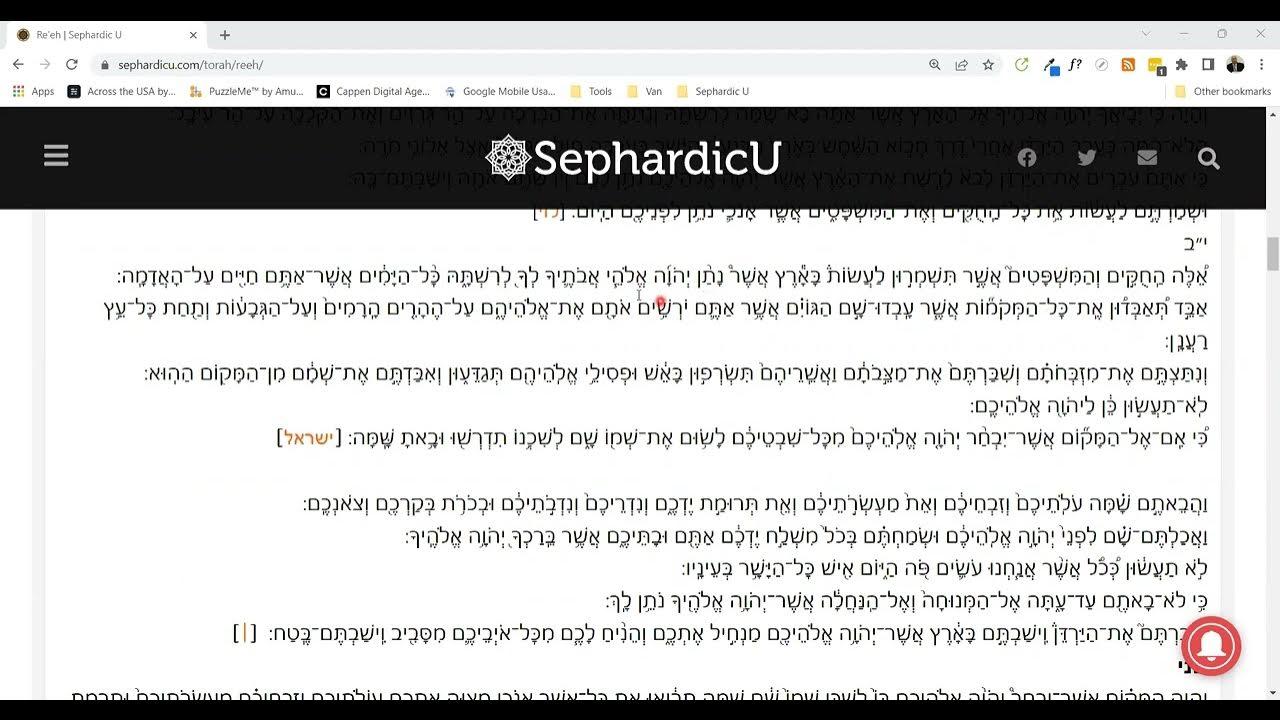| Aspect | Description |
|---|---|
| Parasha Number | The 47th Parasha in the Torah and the 4th in the Book of Deuteronomy (Devarim). |
| Parasha Name | Re’eh (רְאֵה), meaning “See” in Hebrew, referring to the opening verse where Moses urges the Israelites to “see” the blessings and curses set before them. |
| Torah Book | Deuteronomy (Devarim). |
| Number of Verses | Comprises 126 verses. |
| Number of Words | Approximately 1,932 words in the Hebrew text. |
| Primary Characters | Key figures include Moses, as he continues to deliver God’s teachings and laws to the Israelites. |
| Key Themes | Focuses on the choice between blessings and curses, the centralization of worship, dietary laws, charity, tithing, and the observance of festivals. |
| Significant Events | Moses’ instructions on the blessings for obedience and curses for disobedience, the prohibition against idolatry, and the laws concerning kosher animals and charity. |
| Notable Quotes | “See, I set before you today a blessing and a curse…” (Deuteronomy 11:26) |
| Legacy | Parashat Re’eh emphasizes the importance of choice in following God’s commandments, the unity of the community in worship, and the commitment to ethical and religious laws. |
| Relevance Today | The themes of choosing between good and evil, following ethical dietary laws, and charitable giving continue to influence Jewish practice and thought today. |
| Well-Known Stories | The commandment to destroy places of idol worship, instructions about clean and unclean animals, and the establishment of the three pilgrimage festivals (Pesach, Shavuot, Sukkot). |
| Special Observances | Read in synagogues during the summer, often focusing on the choices one makes in life and the adherence to God’s laws. |
| Connections to Texts | Re’eh builds upon the teachings in Deuteronomy, linking the laws given to the Israelites to their immediate future in the Promised Land, emphasizing their moral and spiritual obligations. |
| Theological Significance | Highlights the theme of free will and the importance of adhering to divine commandments as a path to blessings and a righteous life. |
Summary of Parasha Re’eh
Parashat Re’eh is a significant Torah portion found in the Book of Deuteronomy (Devarim) in the Jewish scriptures. The term “Re’eh” translates to “see” in Hebrew, and it derives from the opening verse of the portion: “See, I present before you today a blessing and a curse” (Deuteronomy 11:26).
In Parashat Re’eh, Moses continues his farewell address to the Israelites, preparing them for their entry into the Promised Land. The portion contains a wealth of laws, teachings, and commandments, emphasizing the importance of following God’s guidance and observing His commandments. It serves as a reminder to the Israelites of their covenant with God and the blessings that will come if they remain faithful to His laws.
A significant portion of Re’eh discusses the laws of worship and pilgrimage. It emphasizes the centralization of worship in one location, the place that God will choose, where the Israelites are to bring their offerings and sacrifices. Moses warns against following other gods, and he emphasizes the prohibition of idolatry and the need to destroy any pagan altars and places of worship found in the Promised Land.
Another essential aspect of Parashat Re’eh is the focus on tithes and charity. The Israelites are instructed to set aside a portion of their produce as a tithe and bring it to the chosen place of worship to share with the Levites, the poor, and the strangers residing among them. This commandment highlights the importance of communal responsibility and caring for those in need.
Additionally, the portion addresses the laws of kashrut (kosher dietary laws), instructing the Israelites on which animals are permissible for consumption and which are forbidden. It also outlines the laws regarding tithing animals and the proper ways to prepare and consume meat.
Parashat Re’eh serves as a call to action for the Israelites to choose the path of righteousness and obedience, leading to blessings and prosperity, over the path of disobedience, which would lead to curses and hardship. It emphasizes the significance of making conscious choices, seeing the consequences of their actions, and remaining faithful to God’s covenant.
Today, as Jewish communities around the world read Parashat Re’eh during its annual cycle, they reflect on the teachings and messages it imparts. The themes of responsibility, charity, and faithfulness continue to resonate, serving as a guiding light for individuals to lead meaningful and ethical lives in harmony with the divine will.
ראה
Re’eh
Deuteronomy 11:26-16:17
blessing, if you obey the commandments of your God יהוה that I enjoin upon you this day;
and curse, if you do not obey the commandments of your God יהוה, but turn away from the path that I enjoin upon you this day and follow other gods, whom you have not experienced.
When your God יהוה brings you into the land that you are about to enter and possess, you shall pronounce the blessing at Mount Gerizim and the curse at Mount Ebal.—
Both are on the other side of the Jordan, beyond the west road that is in the land of the Canaanites who dwell in the Arabah—near Gilgal, by the terebinths of Moreh.
For you are about to cross the Jordan to enter and possess the land that your God יהוה is assigning to you. When you have occupied it and are settled in it,
take care to observe all the laws and rules that I have set before you this day.
12
These are the laws and rules that you must carefully observe in the land that יהוה, God of your ancestors, is giving you to possess, as long as you live on earth.
You must destroy all the sites at which the nations you are to dispossess worshiped their gods, whether on lofty mountains and on hills or under any luxuriant tree.
Tear down their altars, smash their pillars, put their sacred posts to the fire, and cut down the images of their gods, obliterating their name from that site.
Do not worship your God יהוה in like manner,
but look only to the site that your God יהוה will choose amidst all your tribes as God’s habitation, to establish the divine name there. There you are to go,
and there you are to bring your burnt offerings and other sacrifices, your tithes and contributions, your votive and freewill offerings, and the firstlings of your herds and flocks.
Together with your households, you shall feast there before your God יהוה, happy in all the undertakings in which your God יהוה has blessed you.
You shall not act at all as we now act here, each of us as we please,
because you have not yet come to the allotted haven that your God יהוה is giving you.
When you cross the Jordan and settle in the land that your God יהוה is allotting to you, and [God] grants you safety from all your enemies around you and you live in security,
Second
then you must bring everything that I command you to the site where your God יהוה will choose to establish the divine name: your burnt offerings and other sacrifices, your tithes and contributions, and all the choice votive offerings that you vow to יהוה.
And you shall rejoice before your God יהוה with your sons and daughters and with your male and female slaves, along with the [family of the] Levite in your settlements, for he has no territorial allotment among you.
Take care not to sacrifice your burnt offerings in any place you like,
but only in the place that יהוה will choose in one of your tribal territories. There you shall sacrifice your burnt offerings and there you shall observe all that I enjoin upon you.
But whenever you desire, you may slaughter and eat meat in any of your settlements, according to the blessing that your God יהוה has granted you. The impure and the pure alike may partake of it, as of the gazelle and the deer.
But you must not partake of the blood; you shall pour it out on the ground like water.
You may not partake in your settlements of the tithes of your new grain or wine or oil, or of the firstlings of your herds and flocks, or of any of the votive offerings that you vow, or of your freewill offerings, or of your contributions.
These you must consume before your God יהוה in the place that your God יהוה will choose—you and your sons and your daughters, your male and female slaves, and the [family of the] Levite in your settlements—happy before your God יהוה in all your undertakings.
Be sure not to neglect the [family of the] Levite as long as you live in your land.
When יהוה enlarges your territory, as promised, and you say, “I shall eat some meat,” for you have the urge to eat meat, you may eat meat whenever you wish.
If the place where יהוה has chosen to establish the divine name is too far from you, you may slaughter any of the cattle or sheep that יהוה gives you, as I have instructed you; and you may eat to your heart’s content in your settlements.
Eat it, however, as the gazelle and the deer are eaten: the impure may eat it together with the pure.
But make sure that you do not partake of the blood; for the blood is the life, and you must not consume the life with the flesh.
You must not partake of it; you must pour it out on the ground like water:
you must not partake of it, in order that it may go well with you and with your descendants to come, for you will be doing what is right in the sight of יהוה.
But such sacred and votive donations as you may have shall be taken by you to the site that יהוה will choose.
You shall offer your burnt offerings, both the flesh and the blood, on the altar of your God יהוה; and of your other sacrifices, the blood shall be poured out on the altar of your God יהוה, and you shall eat the flesh.
Be careful to heed all these commandments that I enjoin upon you; thus it will go well with you and with your descendants after you forever, for you will be doing what is good and right in the sight of your God יהוה.
Third
When your God יהוה has cut down before you the nations that you are about to enter and dispossess, and you have dispossessed them and settled in their land,
beware of being lured into their ways after they have been wiped out before you! Do not inquire about their gods, saying, “How did those nations worship their gods? I too will follow those practices.”
You shall not act thus toward your God יהוה, for they perform for their gods every abhorrent act that יהוה detests; they even offer up their sons and daughters in fire to their gods.
13
Be careful to observe only that which I enjoin upon you: neither add to it nor take away from it.
If there appears among you a prophet or a dream-diviner, who gives you a sign or a portent,
saying, “Let us follow and worship another god”—whom you have not experienced —even if the sign or portent named to you comes true,
do not heed the words of that prophet or that dream-diviner. For your God יהוה is testing you to see whether you really love your God יהוה with all your heart and soul.
It is your God יהוה alone whom you should follow, whom you should revere, whose commandments you should observe, whose orders you should heed, whom you should worship, and to whom you should hold fast.
As for that prophet or dream-diviner, such a one shall be put to death for having urged disloyalty to your God יהוה —who freed you from the land of Egypt and who redeemed you from the house of bondage—to make you stray from the path that your God יהוה commanded you to follow. Thus you will sweep out evil from your midst.
If your brother, your own mother’s son, or your son or daughter, or the wife of your bosom, or your closest friend entices you in secret, saying, “Come let us worship other gods”—whom neither you nor your ancestors have experienced —
from among the gods of the peoples around you, either near to you or distant, anywhere from one end of the earth to the other:
do not assent or give heed to any of them. Show no pity or compassion, and do not cover up the matter;
but take that person’s life. Let your hand be the first to put that person to death, followed by the hand of the rest of the people.
Stone that person to death for having sought to make you stray from your God יהוה, who brought you out of the land of Egypt, out of the house of bondage.
Thus all Israel will hear and be afraid, and such evil things will not be done again in your midst.
If you hear it said, of one of the towns that your God יהוה is giving you to dwell in,
that some scoundrels from among you have gone and subverted the inhabitants of their town, saying, “Come let us worship other gods”—whom you have not experienced—
you shall investigate and inquire and interrogate thoroughly. If it is true, the fact is established—that abhorrent thing was perpetrated in your midst—
put the inhabitants of that town to the sword and put its cattle to the sword. Doom it and all that is in it to destruction:
gather all its spoil into the open square, and burn the town and all its spoil as a holocaust to your God יהוה. And it shall remain an everlasting ruin, never to be rebuilt.
Let nothing that has been doomed stick to your hand, in order that יהוה may turn from a blazing anger and show you compassion, and in compassion increase you as promised on oath to your fathers—
for you will be heeding your God יהוה, obeying all the divine commandments that I enjoin upon you this day, doing what is right in the sight of your God יהוה.
14
Fourth
You are children of your God יהוה. You shall not gash yourselves or shave the front of your heads because of the dead.
For you are a people consecrated to your God יהוה: your God יהוה chose you from among all other peoples on earth to be a treasured people.
You shall not eat anything abhorrent.
These are the animals that you may eat: the ox, the sheep, and the goat;
the deer, the gazelle, the roebuck, the wild goat, the ibex, the antelope, the mountain sheep,
and any other animal that has true hoofs which are cleft in two and brings up the cud—such you may eat.
But the following, which do bring up the cud or have true hoofs which are cleft through, you may not eat: the camel, the hare, and the daman—for although they bring up the cud, they have no true hoofs—they are impure for you;
also the swine—for although it has true hoofs, it does not bring up the cud—is impure for you. You shall not eat of their flesh or touch their carcasses.
These you may eat of all that live in water: you may eat anything that has fins and scales.
But you may not eat anything that has no fins and scales: it is impure for you.
You may eat any pure bird.
The following you may not eat: the eagle, the vulture, and the black vulture;
the kite, the falcon, and the buzzard of any variety;
every variety of raven;
the ostrich, the nighthawk, the sea gull, and the hawk of any variety;
the little owl, the great owl, and the white owl;
the pelican, the bustard, and the cormorant;
the stork, any variety of heron, the hoopoe, and the bat.
All winged swarming things are impure for you: they may not be eaten.
You may eat only pure winged creatures.
You shall not eat anything that has died a natural death; give it to the stranger in your community to eat, or you may sell it to a foreigner. For you are a people consecrated to your God יהוה. You shall not boil a kid in its mother’s milk.
Fifth
You shall set aside every year a tenth part of all the yield of your sowing that is brought from the field.
You shall consume the tithes of your new grain and wine and oil, and the firstlings of your herds and flocks, in the presence of your God יהוה, in the place where [God] will choose to establish the divine name, so that you may learn to revere your God יהוה forever.
Should the distance be too great for you, should you be unable to transport them, because the place where your God יהוה has chosen to establish the divine name is far from you and because your God יהוה has blessed you,
you may convert them into money. Wrap up the money and take it with you to the place that your God יהוה has chosen,
and spend the money on anything you want—cattle, sheep, wine, or other intoxicant, or anything you may desire. And you shall feast there, in the presence of your God יהוה, and rejoice with your household.
But do not neglect the [family of the] Levite in your community, for he has no hereditary portion as you have.
Every third year you shall bring out the full tithe of your yield of that year, but leave it within your settlements.
Then the [family of the] Levite, who has no hereditary portion as you have, and the stranger, the fatherless, and the widow in your settlements shall come and eat their fill, so that your God יהוה may bless you in all the enterprises you undertake.
15
Sixth
Every seventh year you shall practice remission of debts.
This shall be the nature of the remission: all creditors shall remit the due that they claim from their fellow [Israelites]; they shall not dun their fellow [Israelites] or kin, for the remission proclaimed is of יהוה.
You may dun the foreigner; but you must remit whatever is due you from your kin.
There shall be no needy among you—since your God יהוה will bless you in the land that your God יהוה is giving you as a hereditary portion—
if only you heed your God יהוה and take care to keep all this Instruction that I enjoin upon you this day.
For your God יהוה will bless you as promised: you will extend loans to many nations, but require none yourself; you will dominate many nations, but they will not dominate you.
If, however, there is a needy person among you, one of your kin in any of your settlements in the land that your God יהוה is giving you, do not harden your heart and shut your hand against your needy kin.
Rather, you must open your hand and lend whatever is sufficient to meet the need.
Beware lest you harbor the base thought, “The seventh year, the year of remission, is approaching,” so that you are mean and give nothing to your needy kin—who will cry out to יהוה against you, and you will incur guilt.
Give readily and have no regrets when you do so, for in return your God יהוה will bless you in all your efforts and in all your undertakings.
For there will never cease to be needy ones in your land, which is why I command you: open your hand to the poor and needy kin in your land.
If a fellow Hebrew man—or woman—is sold to you, he shall serve you six years, and in the seventh year you shall set him free.
When you set him free, do not let him go empty-handed:
Furnish him out of the flock, threshing floor, and vat, with which your God יהוה has blessed you.
Bear in mind that you were slaves in the land of Egypt and your God יהוה redeemed you; therefore I enjoin this commandment upon you today.
But should he say to you, “I do not want to leave you”—for he loves you and your household and is happy with you—
you shall take an awl and put it through his ear into the door, and he shall become your slave in perpetuity. Do the same with your female slave.
When you do set either one free, do not feel aggrieved; for in the six years you have been given double the service of a hired worker. Moreover, your God יהוה will bless you in all you do.
Seventh
You shall consecrate to your God יהוה all male firstlings that are born in your herd and in your flock: you must not work your firstling ox or shear your firstling sheep.
You and your household shall eat it annually before your God יהוה in the place that יהוה will choose.
But if it has a defect, lameness or blindness, any serious defect, you shall not sacrifice it to your God יהוה.
Eat it in your settlements, the impure among you no less than the pure, just like the gazelle and the deer.
Only you must not partake of its blood; you shall pour it out on the ground like water.
16
Observe the month of Abib and offer a passover sacrifice to your God יהוה, for it was in the month of Abib, at night, that your God יהוה freed you from Egypt.
You shall slaughter the passover sacrifice for your God יהוה, from the flock and the herd, in the place where יהוה will choose to establish the divine name.
You shall not eat anything leavened with it; for seven days thereafter you shall eat unleavened bread, bread of distress—for you departed from the land of Egypt hurriedly—so that you may remember the day of your departure from the land of Egypt as long as you live.
For seven days no leaven shall be found with you in all your territory, and none of the flesh of what you slaughter on the evening of the first day shall be left until morning.
You are not permitted to slaughter the passover sacrifice in any of the settlements that your God יהוה is giving you;
but at the place where your God יהוה will choose to establish the divine name, there alone shall you slaughter the passover sacrifice, in the evening, at sundown, the time of day when you departed from Egypt.
You shall cook and eat it at the place that your God יהוה will choose; and in the morning you may start back on your journey home.
After eating unleavened bread six days, you shall hold a solemn gathering for your God יהוה on the seventh day: you shall do no work.
You shall count off seven weeks; start to count the seven weeks when the sickle is first put to the standing grain.
Then you shall observe the Feast of Weeks for your God יהוה, offering your freewill contribution according as your God יהוה has blessed you.
You shall rejoice before your God יהוה with your son and daughter, your male and female slave, the [family of the] Levite in your communities, and the stranger, the fatherless, and the widow in your midst, at the place where your God יהוה will choose to establish the divine name.
Bear in mind that you were slaves in Egypt, and take care to obey these laws.
After the ingathering from your threshing floor and your vat, you shall hold the Feast of Booths for seven days.
You shall rejoice in your festival, with your son and daughter, your male and female slave, the [family of the] Levite, the stranger, the fatherless, and the widow in your communities.
You shall hold a festival for your God יהוה seven days, in the place that יהוה will choose; for your God יהוה will bless all your crops and all your undertakings, and you shall have nothing but joy.
Three times a year—on the Feast of Unleavened Bread, on the Feast of Weeks, and on the Feast of Booths—all your males shall appear before your God יהוה in the place that [God] will choose. They shall not appear before יהוה empty-handed,
but each with his own gift, according to the blessing that your God יהוה has bestowed upon you.
ישעיהו
נ״ד:י״א-נ״ה:ה׳
וְשַׂמְתִּ֤י כַּֽדְכֹד֙ שִׁמְשֹׁתַ֔יִךְ וּשְׁעָרַ֖יִךְ לְאַבְנֵ֣י אֶקְדָּ֑ח וְכׇל־גְּבוּלֵ֖ךְ לְאַבְנֵי־חֵֽפֶץ׃
וְכׇל־בָּנַ֖יִךְ לִמּוּדֵ֣י יְהֹוָ֑ה וְרַ֖ב שְׁל֥וֹם בָּנָֽיִךְ׃
בִּצְדָקָ֖ה תִּכּוֹנָ֑נִי רַחֲקִ֤י מֵעֹ֙שֶׁק֙ כִּי־לֹ֣א תִירָ֔אִי וּמִ֨מְּחִתָּ֔ה כִּ֥י לֹֽא־תִקְרַ֖ב אֵלָֽיִךְ׃
הֵ֣ן גּ֥וֹר יָג֛וּר אֶ֖פֶס מֵאוֹתִ֑י מִי־גָ֥ר אִתָּ֖ךְ עָלַ֥יִךְ יִפּֽוֹל׃
(הן) [הִנֵּ֤ה] אָנֹכִי֙ בָּרָ֣אתִי חָרָ֔שׁ נֹפֵ֙חַ֙ בְּאֵ֣שׁ פֶּחָ֔ם וּמוֹצִ֥יא כְלִ֖י לְמַעֲשֵׂ֑הוּ וְאָנֹכִ֛י בָּרָ֥אתִי מַשְׁחִ֖ית לְחַבֵּֽל׃
כׇּל־כְּלִ֞י יוּצַ֤ר עָלַ֙יִךְ֙ לֹ֣א יִצְלָ֔ח וְכׇל־לָשׁ֛וֹן תָּקוּם־אִתָּ֥ךְ לַמִּשְׁפָּ֖ט תַּרְשִׁ֑יעִי זֹ֡את נַחֲלַת֩ עַבְדֵ֨י יְהֹוָ֧ה וְצִדְקָתָ֛ם מֵאִתִּ֖י נְאֻם־יְהֹוָֽה׃ {ס}
נ״ה
ה֤וֹי כׇּל־צָמֵא֙ לְכ֣וּ לַמַּ֔יִם וַאֲשֶׁ֥ר אֵֽין־ל֖וֹ כָּ֑סֶף לְכ֤וּ שִׁבְרוּ֙ וֶאֱכֹ֔לוּ וּלְכ֣וּ שִׁבְר֗וּ בְּלוֹא־כֶ֛סֶף וּבְל֥וֹא מְחִ֖יר יַ֥יִן וְחָלָֽב׃
לָ֤מָּה תִשְׁקְלוּ־כֶ֙סֶף֙ בְּלוֹא־לֶ֔חֶם וִיגִֽיעֲכֶ֖ם בְּל֣וֹא לְשׇׂבְעָ֑ה שִׁמְע֨וּ שָׁמ֤וֹעַ אֵלַי֙ וְאִכְלוּ־ט֔וֹב וְתִתְעַנַּ֥ג בַּדֶּ֖שֶׁן נַפְשְׁכֶֽם׃
הַטּ֤וּ אׇזְנְכֶם֙ וּלְכ֣וּ אֵלַ֔י שִׁמְע֖וּ וּתְחִ֣י נַפְשְׁכֶ֑ם וְאֶכְרְתָ֤ה לָכֶם֙ בְּרִ֣ית עוֹלָ֔ם חַֽסְדֵ֥י דָוִ֖ד הַנֶּֽאֱמָנִֽים׃
הֵ֛ן עֵ֥ד לְאוּמִּ֖ים נְתַתִּ֑יו נָגִ֥יד וּמְצַוֵּ֖ה לְאֻמִּֽים׃
הֵ֣ן גּ֤וֹי לֹֽא־תֵדַע֙ תִּקְרָ֔א וְג֥וֹי לֹֽא־יְדָע֖וּךָ אֵלֶ֣יךָ יָר֑וּצוּ לְמַ֙עַן֙ יְהֹוָ֣ה אֱלֹהֶ֔יךָ וְלִקְד֥וֹשׁ יִשְׂרָאֵ֖ל כִּ֥י פֵאֲרָֽךְ׃ {ס}
Isaiah
54:11-55:5
Unhappy, storm-tossed one, uncomforted!
I will lay carbuncles as your building stones
And make your foundations of sapphires.
I will make your battlements of rubies,
Your gates of precious stones,
The whole encircling wall of gems.
And all your children shall be disciples of GOD,
And great shall be the happiness of your children;
You shall be established through righteousness.
You shall be safe from oppression,
And shall have no fear;
From ruin, and it shall not come near you.
Surely no harm can be done
Without My consent:
Whoever would harm you
Shall fall because of you.
It is I who created the smith
To fan the charcoal fire
And produce tools for each purpose;
So it is I who create
The instruments of havoc.
No weapon formed against you
Shall succeed,
And every tongue that contends with you at law
You shall defeat.
Such is the lot of the servants of GOD’s servants,
Such their triumph through Me
—declares GOD.
55
Ho, all who are thirsty,
Come for water,
Even if you have no money;
Come, buy food and eat:
Buy food without money,
Wine and milk without cost.
Why do you spend money for what is not bread,
Your earnings for what does not satisfy?
Give heed to Me,
And you shall eat choice food
And enjoy the richest viands.
Incline your ear and come to Me;
Hearken, and you shall be revived.
And I will make with you an everlasting covenant,
The enduring loyalty promised to David.
As I made him a leader of peoples,
A prince and commander of peoples,
So you shall summon a nation you did not know,
And a nation that did not know you
Shall come running to you —
For the sake of the ETERNAL your God,
The Holy One of Israel who has glorified you.
Re'eh
more on Parashat Parashat Re’eh: Choice and Blessings
Quick Guide: The Five Books of Moses
| Genesis | Exodus | Leviticus | Numbers | Deuteronomy |
|---|---|---|---|---|
| Bereshit (1:1-6:8) |
Shemot (1:1-6:1) |
Vayikra (1:1-5:26) |
Bemidbar (1:1-4:20) |
Devarim (1:1-3:22) |
| Noach (6:9-11:32) |
Va'era (6:2-9:35) |
Tzav (6:1-8:36) |
Naso (4:21-7:89) |
Va'etchanan (3:23-7:11) |
| Lech Lecha (12:1-17:27) |
Bo (10:1-13:16) |
Shemini (9:1-11:47) |
Behaalotecha (8:1-12:16) |
Ekev (7:12-11:25) |
| Vayera (18:1-22:24) |
Beshalach (13:17-17:16) |
Tazria (12:1-13:59) |
Shelach (13:1-15:41) |
Re'eh (11:26-16:17) |
| Chaye Sarah (23:1-25:18) |
Yitro (18:1-20:23) |
Metzora (14:1-15:33) |
Korach (16:1-18:32) |
Shoftim (16:18-21:9) |
| Toledot (25:19-28:9) |
Mishpatim (21:1-24:18) |
Achare Mot (16:1-18:30) |
Chukat (19:1-22:1) |
Ki Tetze (21:10-25:19) |
| Vayetze (28:10-32:3) |
Teruma (25:1-27:19) |
Kedoshim (19:1-20:27) |
Balak (22:2-25:9) |
Ki Tavo (26:1-29:8) |
| Vayishlach (32:4-36:43) |
Tetzave (27:20-30:10) |
Emor (21:1-24:23) |
Pinchas (25:10-30:1) |
Nitzavim (29:9-30:20) |
| Vayeshev (37:1-40:23) |
Ki Tisa (30:11-34:35) |
Behar (25:1-26:2) |
Matot (30:2-32:42) |
Vayelech (31:1-30) |
| Miketz (41:1-44:17) | Vayakhel (35:1-38:20) |
Bechukotai (26:3-27:34) |
Masei (33:1-36:13) |
Haazinu (32:1-52) |
| Vayigash (44:18-47:27) |
Pekude (38:21-40:38) |
V'Zot HaBeracha (33:1-34:12) |
||
| Vayechi (47:28-50:26) |

